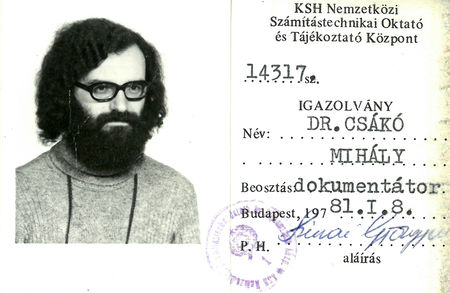Mihály Csákó would have celebrated his 82nd birthday today, on November 19. The sociologist’s personal papers were donated to the Blinken OSA Archivum by his final workplace, the John Wesley Theological College. We are pleased to announce that, with the archival processing done, the Mihály Csákó Personal Papers are now accessible in the Research Room, and its detailed catalog entry can be browsed online! The rich collection revolves around topics like sociology of education, research on apprentices, democratic civic education, computerization in schools, trade union movements and, at the same time, Csákó’s democratic opposition activities and teaching work.
“I became a sociologist out of necessity,” Mihály Csákó said. He graduated from Eötvös Loránd University, Budapest (ELTE) in 1964, and then from Nancy University in 1968, experiencing May 68 in France, which had a lasting effect on him. By that time, he was assistant professor at the Department of Philosophy, ELTE, but in 1970 he was expelled after he and Mihály Hamburger had developed a New Left concept of teaching Marxism. He worked at the Institute of Social Sciences of the Central Committee of the Hungarian Socialist Workers’ Party, where he and Ilona Liskó started examining apprentices in 1972. By the end of the decade, Csákó was already an active member of the unofficial opposition, in 1979 he signed the petition supporting the organizers of Charter 77, so he was forced to leave the institute in 1980. Simultaneously to running an employment agency for opposition members in his apartment, he worked as documenter at the Computer Science Training Center of the Central Statistical Office. Here he turned to computer science, and compiled the Hungarian history of computer science. However, as was prevented from addressing sociological issues, he quit in 1985 to pursue research as a freelancer in the field of computer sociology, especially in the computerization of education. By this time he was a busy samizdat distributor, from 1988 he was a board member of the Democratic Trade Union of Scientific Workers, then one of the leaders of the Independent League of Democratic Trade Unions, which he represented at the Opposition Roundtable. After the 1989 regime change, he taught at ELTE as associate professor, was director of the university’s Institute of Sociology and Social Policy between 1992 and 1994, and participated in the establishment of its Faculty of Social Sciences; also he was a visiting professor at the University of Pittsburgh in the United States. His main interest became political socialization and sociology of education, and he conducted indispensable surveys in the 1990 and 2000s. From 2008 until his death, he taught at the John Wesley Theological College.
The fonds HU OSA 429 Mihály Csákó Personal Papers almost completely encompasses the exceptional career above, with its structure reflecting major biographical chapters. The largest, main subfond contains records related to Csákó’s social-scientific activities: from the examination of skilled workers (also including, besides research materials and reports, Gusztáv Hámos’s photo series) to computer technology and to political socialization. The series in the second subfond present his teaching activities at Eötvös Loránd University Faculty of Arts and its Institute of Sociology and Social Policy, in the United States, at Eötvös Loránd University Faculty of Social Sciences, and finally at the John Wesley College. His public activities preceding and following the 1989 regime change compose a shared subfond, with his samizdat collection next to the records of the employment agency and documents related to his trade union activities, as well as to the Independent Youth Parliament. The last, fourth subfond comprises personal documents and records related to Csákó’s scientific memberships, employers, and university studies, also including leaflets and draft translations from the defining years spent in France.
The collection is now accessible at the Blinken OSA Archives Research Room.
Early next year, we will organize a discussion with lecturers, thesis supervisors, and doctoral students,
exploring the potentials in utilizing the collection.

